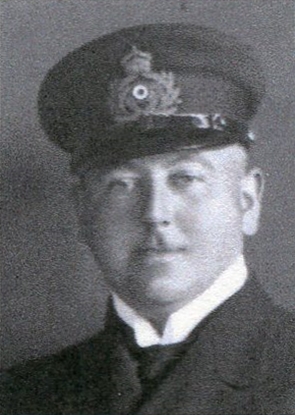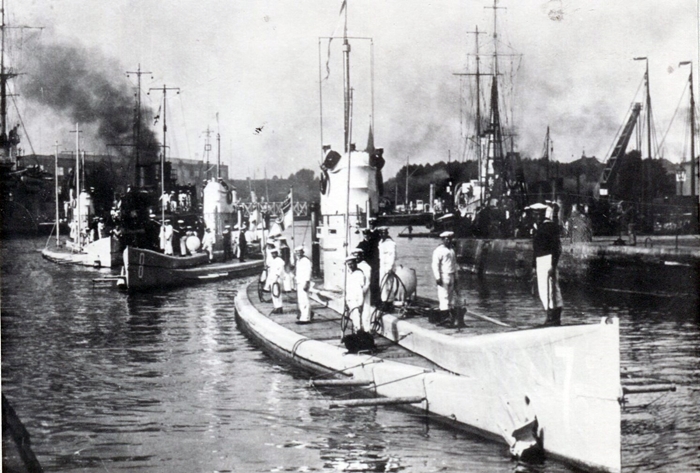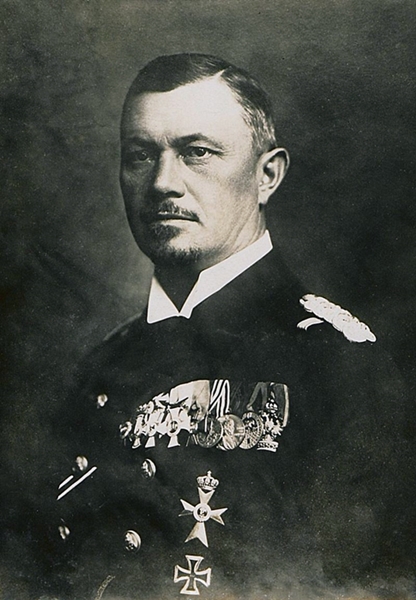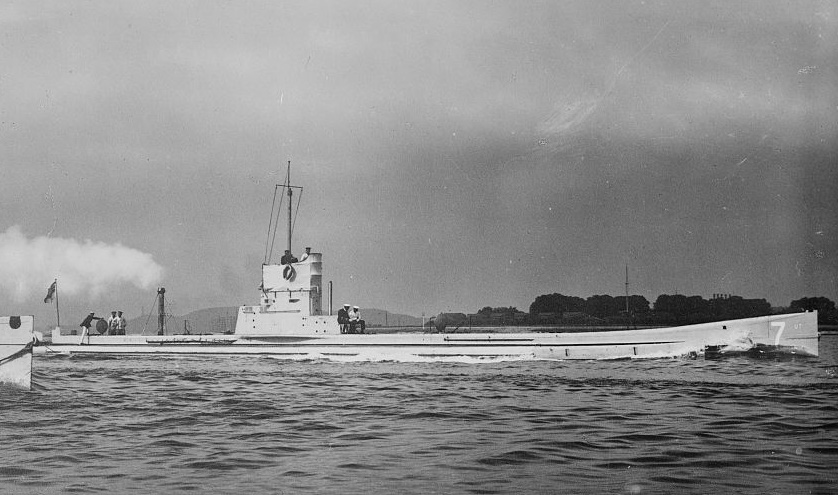The Struggle for the Room-Restriction Allowance
 Georg-Günter Freiherr von Forstner (1882-1940), a submarine commander of the Imperial Navy, describes in his eyewitness account the efforts of the still young U-boat weapon for a financial allowance for U-boat crews during a large-scale visit to the submarines by Admiral Scheer of the German Imperial Naval Office in 1912. At that time von Forstner was commander of the kerosene-driven U-boat SM U 7. Shortly before the outbreak of the First World War, he took over the more modern diesel boat U 28, with which he sank 26 ships with a total of 57,813 BRT until the beginning of 1917. After he left his boat, he became a teacher at the U-boat school. Immediately after the war he was for some time party secretary of the German National People’s Party and later worked as a writer and lecturer. On 26 October 1940, during a car ride, he succumbed to a sudden heart attack.
Georg-Günter Freiherr von Forstner (1882-1940), a submarine commander of the Imperial Navy, describes in his eyewitness account the efforts of the still young U-boat weapon for a financial allowance for U-boat crews during a large-scale visit to the submarines by Admiral Scheer of the German Imperial Naval Office in 1912. At that time von Forstner was commander of the kerosene-driven U-boat SM U 7. Shortly before the outbreak of the First World War, he took over the more modern diesel boat U 28, with which he sank 26 ships with a total of 57,813 BRT until the beginning of 1917. After he left his boat, he became a teacher at the U-boat school. Immediately after the war he was for some time party secretary of the German National People’s Party and later worked as a writer and lecturer. On 26 October 1940, during a car ride, he succumbed to a sudden heart attack.
Our first, big U-boat Inspection in 1912
In the summer of 1912, our first U-boat flotilla, which had just been founded, was to be subjected to a special kind inspection. It was not a military demonstration, but a visit to the port should be made by the chief of the German Imperial Naval Office or a representative of the latter.

This inspection was based on a purely material or administrative purpose. In accordance with the request of the submarine front, the naval administration had applied to the German Imperial Naval Office for the granting of allowances to the U-boat crews as compensation for special wear and tear of clothing, and for the difficult and restrictive living conditions. The German Imperial Naval Office was always a little hard to come by with its generosity for granting allowances. For this, it was always necessary for a departmental office to submit its own expert opinion.

Thus, Konteradmiral Scheer came to us as a representative of the German Imperial Naval Office. With five boats we lay alongside our flotilla guide boat D 5 at the Blücher bridge in Kiel. Each boat was in a different state of readiness to be able to demonstrate all living conditions to the inspector.
The 1st boat “Harbor clear”. No special precautions needed to be taken here.
The 2nd boat “ready for sea surfaced”. While the command bridge canvas was rigged up, the tower crew stood on top of it in “bad weather suit” despite the hot summer heat. While the deck hatches were closed, the rest of the crew had to stay inside the boat. This was less pleasant.
The 3rd boat was “ready to dive” with the command bridge canvas removed. In the open turret hatch, already ready to climb in, only the commander was sitting in his leather suit.
The fourth boat was my subordinate, the U 7. We had a inspection of provisions. This was easier to reconcile.
Finally the 5th boat, it was U 9 under his first commander, my good friend and comrade Lieutenant Commander Fürst, was supposed to be inspected in “sleeping”, with all the crew lying in their bunks or hammocks until the high Mr. Admiral came. This was also a quite bearable branch of the tour, although it also was perhaps a little warm. Anyway, I thought we had caught the best part on U 7 with the inspection of provisions.
Right on time at 8 a. m. we had to report to our flotilla chief “Ready for inspection”. In preparation I, or rather my boat´s cook, had it the hardest, because exactly on the arrival of the admiral the “lunch” had to be served without being burned or being raw. I had prepared white cabbage with mutton, because with the closed hatches this dish seemed to be most suitable to depict a midday U-boat atmosphere to me. There should have been kale, but it was not available in summer.
But the admiral didn’t come. From 9 o’ clock on, my cook became restless and told me:”I can’t hold the mutton cabbage any more. It has to be spended on the people, we can’t face the admiral with charcoal burned mutton cabbage. That made sense to me, and after my cook had promised me to make a second dish ready for serving as soon as the admiral was happy in sight, we on SM U 7 had our first lunch on this high inspection day at 9:15 a. m. .

At about 10 o’ clock in the morning, Konteradmiral Scheer arrived. First, after the greeting on the flotilla boat, the first three boats were inpected before me, and I could be completely reassured when my cook told me:”Until the admiral inspected the other three boats, I am surely ready with the fresh mutton cabbage again”. Rear Admiral Scheer had now appeared in his brand new uniform from Berlin. For the intended purpose, our Flag Lieutenant, Lieutenant Commander Schött, skillfully drew his attention to the fact that it would be impossible for him to go out on the streets with this uniform, if he were to descend into the oily U-boat even for a short time. This was obvious to the high inspecteur, and so he gladly changed into a jacket of the watch officer Oberleutnant (=Lieutenant) Schwieger, the later so successful commander of U 20.
Now the mishap was of course not to be averted, that all people addressed the high admiral only with “Herr Oberleutnant”, which he quite liked to put up with, or finally simply had to. When he came to us on U 7, the second lunch was served at 10:30 a. m. Interested and affable, Admiral Scheer asked my sailors:”Well, this tastes good?” – “And how! Only that everything tastes like kerosene here, Herr Oberleutnant” Soon my cook came along, with a steaming plate and a spoon:”Do you want to try, too, Herr Oberleutnant?” and in fact this serving might have tasted a little more like kerosene than our ones. So he ditched it after the first spoon and went over to U 9, where he soon had enough to crawl under the hammocks, which were hanging particularly low due to the heat of the day. When he noticed a whole series of oil stains on his lieutenant’s jacket in broad daylight, which had perhaps been on it before, he was pleased that his new uniform had luckily escaped this strains. Soon afterwards, the German Imperial Naval Office granted us a special allowance, which was given the beautiful name “Room-Restriction Allowance”.
At noon at 12 o’ clock we had a third lunch in the form of mutton cabbage on U 7. But after lunch, my people had to digest in the open air, and I overheard a conversation between my sailors and their comrades from U 9: “I don’t understand why we make such trouble for a lieutenant from Berlin -” Never mind such inspection, Karl, lying in the hammock until noon, that’s quite nice,”and Karl gave back:” And have lunch three times in the morning, we don´t have that every day”. With the words:”Such a guy can come again and again with pleasure” the criticism of my sailors about this first visit to our U-boats was over.
